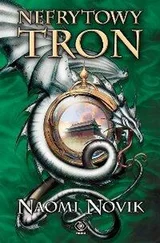No-one went pouring slurry on Iskierka, who slept in hissing, steaming state coiled along the front of the dragondeck; Temeraire regarded her with deep disfavor. At least Kulingile was being useful, and fishing: even if he did eat most of what he caught himself, that at least kept him from eating everything in sight at dinner-time, and looking wistfully over at other people’s portions if one did not eat quickly enough.
“You needn’t rock the boat so hard when you land,” Iskierka even complained, when Kulingile had dropped back down licking his chops.
“You needn’t make a noise about anyone else who is not lazing about quite uselessly,” Temeraire said, “and that is very kind of you, Kulingile; thank you,” he added graciously, taking the remnants of the small whale which Kulingile had brought back to offer around, though the edges were ragged and somewhat gnawed, and even these leftovers were more than Temeraire really wanted. He did not quite like to admit that he could not eat so much as Kulingile; it did not seem fair that anyone who had started quite so small and deflated should now be larger than himself, and very soon might even outstrip Maximus.
“I am not hungry,” Iskierka said. “If there were any prizes in sight, that would be different, but there is no sense in flying around only for fish one does not want. Anyway you are not hunting yourself, either.”
“I am guarding the ship from the serpents,” Temeraire said, dignified.
* * *
The last of the serpents fell back to Sydney by mid-morning the next day, and left the Allegiance alone and driving towards the roaring forties: the water cold, dark iron-grey, and mazed with greenish froth. Laurence joined Riley at the stern to watch them go, through the glass: spined backs breaching the surface in glittering curves up and down as they swam, until they reached the end of the water stirred up in the Allegiance ’s wake, and then plunged deep and vanished.
From there on, monotony, of the sort a sailor loved best: a steady knife-edged wind at their back, and the sun small and cold white on the horizon for all but a few hours of the day. Laurence woke each day to the holystoning of the deck, the round of the ship’s bells; sometimes in the first confusion of rising he wondered why he had not been called for the morning’s watch, and looked in vain for a blue coat.
He could have wished only for a little more occupation: he had grown used in the valley to have every day as much to do as could be done, and found himself now unequal to the task of filling the hours aboard a ship where he had no duty but to be a passenger. Even his self-imposed duties as schoolmaster were usurped by Roland’s chaperone, whom he could not deny was better suited to the task than himself, having before her marriage served as a governess.
He had Granby for company; and might have had Riley, but their relations had never quite recovered from the tensions which had arisen on their journey to Africa. Riley’s father was a slave-owner in the West Indies; Laurence’s own, Lord Allendale, devoted to the cause of abolition: the voyage which led them past all the wretched slave-port cities of that continent had left them constantly rubbed against one another, and without room for apology. Laurence could not open his real feelings on the subject of their mission to Riley; Riley could scarcely avoid knowing what those feelings were; they walked around each other with scrupulous courtesy, and spoke only of sailing, and the weather, and the life of the ship.
Laurence had the pleasure, at least, of going out flying with Temeraire: cold air brisk in their faces, clouds stinging with snow if they ventured south, and beneath them now and again great silvery schools of fish, or pods of whales or porpoises; occasionally the shadow of a handful of sharks. “I do wonder why they are not at all good eating when what they eat themselves is nice; it seems a waste,” Temeraire said, as an aside, before continuing, “And I do not see why we should not do exactly as you propose, Laurence: after all, if the Tswana will take away the slaves anyway, the Portuguese may as well let them all go instead and not have all their cities destroyed, too.”
“The Tswana cannot hope to raid all of Brazil,” Laurence said, “not in time to rescue any of their people yet alive; if that is their only preoccupation.”
He spoke cautiously but hoped otherwise: the Tswana had bent their wrath against even slave ports which had never shipped a single one of their own people, at great distances from their empire; that augured for a chance of persuading them to accept the offer which Laurence privately wished to make: a general liberation throughout the country, in lieu of having all their particular kindred returned.
This hope he did not intend to unfold as yet to anyone but Temeraire; Laurence could easily imagine Hammond’s reaction. Wholesale abolition would scarcely recommend itself to the Portuguese, and might not satisfy the Tswana, either; but the mere possibility of engineering such a stroke demanded any effort in its pursuit.
“At least we must make the attempt; and if we had no other cause to come away, it must have been enough,” he added.
“Certainly we must; and I am sure that the Portuguese will think better of refusing, if they do, when the Tswana have burned up a few more of their cities,” Temeraire said blithely. “And I do not see that Hammond will have any reason to complain, if we should make peace as he wishes. Then we will go back to Britain and defeat Napoleon at last. Do you suppose that is a prize, Laurence?”
It was not: a whaler in the distance, almost certainly a neutral; too small to support Temeraire’s weight, and undoubtedly only to be alarmed by such a visit even if they had been worth bespeaking for news. Temeraire looked around inquiringly; Laurence shook his head in answer; they wheeled away and flew onward without descending even to be seen.
The ocean was otherwise deserted and had been for weeks now; a few islands along their way, mostly rocky outcroppings of deserted volcanic rock half-eaten by lichen. The isolation, for lack of work, was more to be felt than in their valley; Laurence chose to feel it more. It was what he must expect, if he did not mean to subject himself to authority or ask Temeraire to do the same; if they meant to follow their own judgment. Laurence could not but look down half-rueful and half-amazed at the ship below, when they returned to her, and he saw in her the orderly decided pattern of his former life: an ordinary life, a comprehensible one.
He wondered suddenly at Bonaparte: at a man who would discard such a life deliberately, not under an inexorable press of duty or honor but only a flashing reckless hunger; at a man who could put himself outside the society of his fellows for such a motive. “I do not suppose anything will ever content him,” he said to Temeraire. “What victory, what glory, could satisfy such a man? Although perhaps age may do what the mere turning of the world will not, and wear away the worst of his ambition.”
“You may be sure that even if he were to grow tired of conquering and glory, that Lien would not; after all she will not be old for a very long time,” Temeraire said darkly. “And anyway it does not seem to me we ought to only wait and hope: we had much better stop him ourselves, and be quite sure he cannot do any more harm.”
“If Napoleon can seek to ascend all the thrones of Europe, I suppose we may go dragging them out from under him,” Laurence said, although with some humor: descending alone from Temeraire’s back to a ship on the far side of the world in the midst of a cold ocean, and setting his sights on the acknowledged sovereign of a great nation and the conqueror of half of Europe.
Читать дальше












